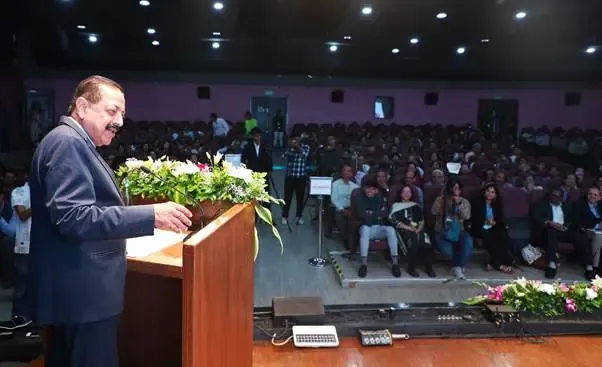Will Jitendra Singh's Rs 720-crore Quantum Facilities Transform IIT Bombay?

Synopsis
Key Takeaways
- Investment: Rs 720 crore allocated for quantum facilities.
- Institutes Involved: IIT Bombay, IISc Bengaluru, IIT Kanpur, IIT Delhi.
- Focus Areas: Quantum sensing, computing, and materials.
- Accessibility: Open to academia, industry, and startups.
- Future of Healthcare: Potential breakthroughs in medical technology.
Mumbai, Nov 24 (NationPress) The Union Minister of State (Independent Charge) for Science and Technology, Jitendra Singh, revealed on Monday the creation of four advanced quantum fabrication and central facilities valued at Rs 720 crore across IIT Bombay, IISc Bengaluru, IIT Kanpur, and IIT Delhi as part of the National Quantum Mission (NQM).
During his visit to IIT Bombay, the Minister stated that these innovative facilities signify a significant advancement in India's technological sovereignty, positioning the country among the few global pioneers in the field of next-gen quantum technologies.
Under the visionary guidance of Prime Minister Narendra Modi, India has established itself as one of the first nations to initiate a National Quantum Mission (NQM), showcasing the Union government's commitment to embracing groundbreaking ideas and swiftly converting them into national projects.
He emphasized that the new fabrication and characterization abilities, which encompass quantum sensing, quantum computing, and quantum materials, will form the essential hardware ecosystem required for developing sovereign, secure, and scalable quantum devices and systems domestically.
These facilities, he noted, will be accessible not only to NQM researchers but also to academic institutions, industry players, startups, and strategic sectors throughout India.
Recognizing IIT Bombay as one of the country's oldest and most esteemed science and technology institutions, the Minister pointed out that it has consistently collaborated with the Department of Science and Technology since its inception and remains a national leader in deep-tech fields.
He indicated that IIT Bombay and IIT Kanpur will spearhead the nation's quantum sensing and metrology framework; IISc Bengaluru and IIT Bombay will enhance quantum computing fabrication using superconducting, photonic, and spin qubits; while IIT Delhi will act as the hub for India's quantum materials and device development.
According to the Union Minister, these capabilities will create a controlled setting for prototyping indigenous quantum devices, fostering translational research, and preparing the next generation of experts in quantum hardware.
He remarked on the remarkable progress in science and medical technology over the years, from traditional invasive diagnostic techniques to the emerging non-invasive, physics-driven therapies of today, asserting that quantum technologies will further expedite this transition, leading to breakthroughs in healthcare, diagnostics, imaging, materials science, and advanced computing.
He also noted that the growing demand for deep-tech innovations in India necessitates interdisciplinary training, suggesting that future medical education may soon require physics as a fundamental component.
The Minister commended institutions like IIT Bombay, IIT Kanpur, and IISc for their advancements toward integrated medical-tech research ecosystems.
He underscored the necessity of dismantling silos and promoting collaborative efforts among major institutes to translate academic R&D into tangible real-world impacts.
He referenced his efforts in facilitating multi-institutional MoUs among IITs, AIIMS, IIMs, CSIR labs, and communication institutes to create stronger market connections, broader public sharing of scientific advancements, and more effective outreach to stakeholders such as students, farmers, and startups.









